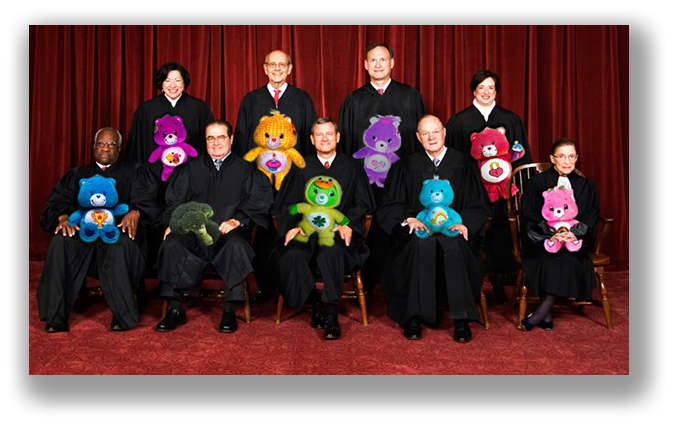We post news and comment on federal criminal justice issues, focused primarily on trial and post-conviction matters, legislative initiatives, and sentencing issues.

BUT WAIT, THERE’S MORE…
More in the continuing saga of Judge James Gwin versus FCI Elkton – in which the Cleveland-based Federal Judge issued a preliminary injunction against the Federal Bureau of Prisons facility because the conditions of confinement of inmates especially vulnerable to COVID-19 was likely to constitute “deliberate indifference” (a term loaded with 8th Amendment implications)… and the BOP ran to the Supreme Court to complain about an (allegedly) out-of-control federal district court.
 Yesterday, the Supreme Court denied the BOP’s request that it stay the Judge’s injunction by a 6-3 vote. It reminded me of my Little League umpiring days… an exuberant base runner chugging around the diamond on his way to a home run misses touching second base by a foot or so. When he makes it to home, I have to call him out. A lot of parents boo.
Yesterday, the Supreme Court denied the BOP’s request that it stay the Judge’s injunction by a 6-3 vote. It reminded me of my Little League umpiring days… an exuberant base runner chugging around the diamond on his way to a home run misses touching second base by a foot or so. When he makes it to home, I have to call him out. A lot of parents boo.
Like that, the Supreme Court called the BOP out on an obvious blunder: the BOP effectively wanted a stay of last Tuesday’s District Court order that directed it to take specific steps to get Elkton inmates moving to home confinement. But the BOP did not seek a stay in the Court of Appeals first. Like base running, you can’t get away with crossing home plate if you don’t tag all of the preceding bases.
Practically speaking, the Supremes’ denial means that the District Court’s demand that the BOP actually address its disastrous management of COVID-19 at FCI Elkton may proceed unimpeded.
Last month, as I described at the time, Judge James Gwin of the U.S. District Court for the Northern District of Ohio granted a preliminary injunction ordering BOP officials at FCI Elkton (located about 70 miles southeast of Cleveland) to identify, and then to start transferring or releasing to home confinement medically vulnerable prisoners. The BOP promptly appealed this order to the U.S. Court of Appeals for the Sixth Circuit, but the Sixth bounced the appeal in a brief order finding that Judge Gwin had not abused his discretion.
 After that (at least according to the plaintiffs and Judge Gwin) the BOP slow-walked the identification and transfer of vulnerable inmates. After all, judges retire, pandemics fade… if the agency could only do nothing long enough, the problem might take care of itself.
After that (at least according to the plaintiffs and Judge Gwin) the BOP slow-walked the identification and transfer of vulnerable inmates. After all, judges retire, pandemics fade… if the agency could only do nothing long enough, the problem might take care of itself.
A week ago, Judge Gwin had had enough, and let the BOP know it. Finding that that BOP had not complied with his directive from last month to clear out Elkton in order to protect vulnerable people from the spread of coronavirus (which has already killed nine Elkton inmates and 64 federal inmates nationally), the Judge said the BOP had “made only minimal effort to get at-risk inmates out of harm’s way.” As of May 8, 2020, five subclass members were “pending [home confinement] community placement. Six inmates were identified as maybe qualifying for home confinement. No inmates were deemed eligible for furlough transfer. But to date, Respondents have not identified any inmates whose confinement has actually been enlarged as a consequence of the preliminary injunction.”
The Judge ordered the BOP to loosen requirements on who qualifies for placement on home confinement under the Bureau’s CARES Act authority by
• eliminating requirements about length of his or her sentence an inmate has served (reversing the BOP’s position that an inmate had to have served 50% of his or her entire sentence, or 25% and have less than 18 months to go, in order to be eligible);
• disregarding whether they committed had certain low or moderate offenses within the past 12 months (reversing the BOP’s position that any disciplinary report in the past 12 months – from possessing a shank or taking an apple from the chow hall to eat later) – was automatically disqualifying);
• eliminating a BOP requirement that the inmate be a U.S. citizen in order to get CARES Act home confinement placement;
• eliminating the requirement that an inmate with a “low” PATTERN risk score be denied CARES Act home confinement placement; and
• disregarding the fact that an inmate is serving time for a “violent” crime (and “violence” is being defined more broadly by the BOP than by any other government agency interpreting federal law) if the crime occurred more than five years ago.
The Court instructed the BOP to explain in detail to the court why any inmate was denied CARES Act placement or Bureau recommendation for compassionate release furloughed or moved to another facility, the prisons bureau must also explain why.
The judge’s order observed that “[b]y thumbing their nose at their authority to authorize home confinement, Respondents threaten staff and they threaten low security inmates.”
 Previously, the BOP had tried without success to get the Sixth Circuit to stay the injunction. After last week’s order from the Judge spelling out what Elkton was to do right away, the BOP an application for a Supreme Court stay of Judge Gwin’s preliminary injunction “pending appeal of that injunction to the United States Court of Appeals for the Sixth Circuit and, if the court of appeals affirms the injunction, pending the filing and disposition of a petition for a writ of certiorari and any further proceedings in this Court.”
Previously, the BOP had tried without success to get the Sixth Circuit to stay the injunction. After last week’s order from the Judge spelling out what Elkton was to do right away, the BOP an application for a Supreme Court stay of Judge Gwin’s preliminary injunction “pending appeal of that injunction to the United States Court of Appeals for the Sixth Circuit and, if the court of appeals affirms the injunction, pending the filing and disposition of a petition for a writ of certiorari and any further proceedings in this Court.”
The problem with the BOP’s Supreme Court filing was evident from the get-go. Although it claimed to be seeking a stay of the April injunction, the BOP spent much of its brief complaining about last Tuesday’s order. As the inmate plaintiffs cheerfully pointed out in their response filed last Friday, the BOP had never asked the Sixth Circuit to review last week’s order, and jumping the appeals court to straight to SCOTUS is not allowed.
Yesterday, the Supremes agreed, but with a caveat:
[O]n May 19, the District Court issued a new order enforcing the preliminary injunction and imposing additional measures. The Government has not sought review of or a stay of the May 19 order in the U.S. Court of Appeals for the Sixth Circuit. Particularly in light of that procedural posture, the Court declines to stay the District Court’s April 22 preliminary injunction without prejudice to the Government seeking a new stay if circumstances warrant.

The Court seemed to be leaving the door open a crack, inviting the BOP to come back if it was unsuccessful in getting the Court of Appeals to stay the latest order.
Justices Thomas, Alito and Gorsuch voted to grant the stay, meaning that Chief Justice Roberts, Kavanaugh, Breyer, Ginsburg, Kagan and Sotomayor were in the majority, denying the stay.
Williams v. Wilson, Case No. 19A-1041, 2020 U.S. LEXIS 2951 (Supreme Court, May 26, 2020)
– Thomas L. Root

